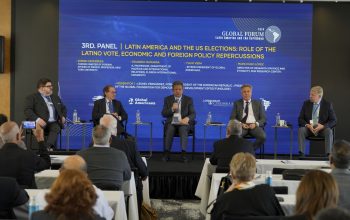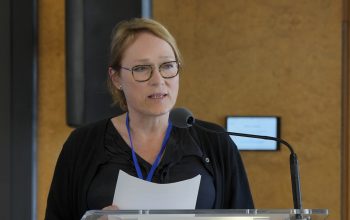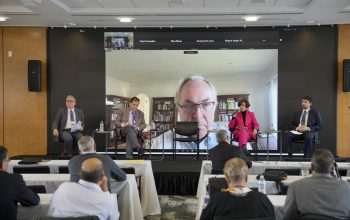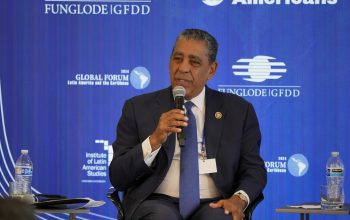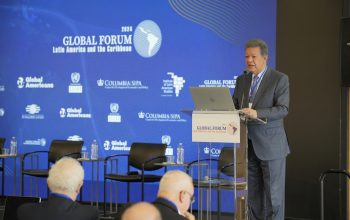news
“Impact Investment Could be Valued at $2 Trillion if it Were to Represent only 1% of Total Global Assets” States GFDD Fellow Jenna Giandoni During World Bank Panel Discussion
April 18, 2017
GFDD in partnership with the NGO Committee on Social Development and the NGO Committee on Financing for Development, held a publication launch and panel discussion before a packed audience room of over 70 people during the 2017 World Bank/IMF Spring Meetings Civil Society Policy Forum entitled "Impact Investment as a Tool for Social Development".
The event was held as part of the official launch of the GFDD/Funglode publication entitled
“Impact Investing in the Dominican Republic” by Jenna Giandoni, GFDD Fellow and dual candidate for a Master of Business Administration and Master of Science Environmental Management & Sustainability at Illinois Institute of Technology (Illinois Tech) in Chicago, Illinois.
The panel discussion featured a wide variety of high-level speakers, in addition to Ms. Giandoni, including Dr. Muthukumara Mani, Lead Environmental Economist for the World
Bank Group and Mr. Nicola Sanna, CEO at RiskLens and Board Member of the North American, Economy of Communion with the aim of presenting several case studies on impact investment from the perspective of different stakeholders.
The event was moderated by Marc Jourdan, GFDD’s UN Programs & Outreach Manager, who welcomed the audience and highlighted the importance of the forum as an opportunity for civil society representatives to
share ideas on innovative tools for financing for development and engaging with other stakeholders on these issues, including government representatives, World Bank & IMF staff. Jourdan introduced the speakers before handing the floor to Giandoni who presented the findings of her study which focused on the benefits of impact investment within the renewable energy and sustainable agriculture industry in the Dominican Republic.
Referring to the case studies
researched during her time in the Dominican Republic, Giandoni explained that sustainable cacao plantations such as Chocal brought numerous social benefits to the local community including the creation of nearly 30 jobs and the possibility of flexible work life balance for the women employed in the industry as they could bring their own children to their place of work. Within the renewal energy industry, Giandoni highlighted that this sector was obviously more capital intensive due to the
technical nature of the industry itself. That being said, the author pointed out to the audience that “impact investment could represent $2 trillion if it were to represent only 1% of total global assets”. She recommended that capacity building would be one of the policy solutions that could bring this hypothetical situation closer to reality.
Dr. Muthukumara Mani, Lead Environmental Economist for the World Bank Group next made some remarks about the
opportunities presented by investment in clean energy, particularly in terms of winning the battle against climate change. Mani explained that “continuing climate change will present severe challenges to poverty eradication”. He stressed that private financing for clean energy is on the rise, particularly in developing countries which appear to be catching up with developed countries. Despite these opportunities, Mani cautioned the audience that such opportunities would
not be realized without the appropriate renewable energy policy support from the public sector, which would provide the enabling environment for such investments.
Mr. Nicola Sanna, CEO at RiskLens and Board Member of the North American, Economy of Communion Commission (EOC) gave the final presentation, to provide an overview of the work of EOC which promotes a new enterprise-driven form of social and economic development, where businesses engage the needy in their
communities to assess their needs. He explained that “Promoting a culture of giving is at the center of the Economy of Communion”. To do this he underscored the importance of “building relations on the ground to make a difference”.
Following the presentations Jourdan moderated an engaged Q&A session with the audience that debated several issues with the panelists from the possibility of impact investment for microgrids to
the potential growing role of accountability as part of the future of impact investment.
About the Civil Society Policy Forum:
The Civil Society Policy Forum (CSPF) has become an integral part of the International Monetary Fund and World Bank Group Spring and Annual Meetings, providing an open space for Civil Society Organizations (CSOs) to dialogue and exchange views with World Bank Group and IMF staff, their peers, government delegations,
and other stakeholders on a wide range of topics, including efforts to tackle poverty reduction, boost shared prosperity, secure financial stability, promote high employment and sustainable economic growth around the world.
This spring, the CSPF is convening in Washington DC from Monday, April 17 to Friday, April 21, 2017.
About the Spring Meetings:
The Spring Meetings of the International Monetary Fund (IMF) and the World
Bank Group each year bring together central bankers, ministers of finance and development, private sector executives, and academics to discuss issues of global concern, including the world economic outlook, poverty eradication, economic development, and aid effectiveness. Also featured are seminars, regional briefings, press conferences, and many other events focused on the global economy, international development, and the world”s financial system.
Presentations:
Jenna Giandoni, GFDD Fellow and Author of Impact Investing in the Dominican Republic
Dr. Muthukumara Mani, Lead Environmental Economist for the World Bank Group
Mr. Nicola Sanna, CEO at RiskLens and Board Member of the North American, Economy of Communion


